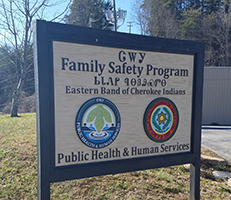Eastern Band of Cherokee Indians Selects a Workforce Intervention: Onboarding
 The Family Safety Program (FSP) serves the Eastern Band of Cherokee Indians (EBCI) to provide high quality and innovative care, utilizing an integrated model to ensure client access to behavioral health services and targeted case management. To retain a competent and committed workforce and best serve children and families, FSP partnered with the Quality Improvement Center for Workforce Development (QIC-WD) to be one of eight national project sites to test child welfare workforce interventions.
The Family Safety Program (FSP) serves the Eastern Band of Cherokee Indians (EBCI) to provide high quality and innovative care, utilizing an integrated model to ensure client access to behavioral health services and targeted case management. To retain a competent and committed workforce and best serve children and families, FSP partnered with the Quality Improvement Center for Workforce Development (QIC-WD) to be one of eight national project sites to test child welfare workforce interventions.
In 2018, FSP conducted a workforce needs assessment, which revealed that staff had inconsistent job expectations for their own role and lacked understanding of the roles of the various teams within FSP, at times leading to tension among teams. Furthermore, 68% of frontline workers are not enrolled EBCI tribal members and additional cultural training was identified as a need for new workers.
FSP decided to implement an updated onboarding process to help standardize the experience of new workers. The new onboarding process will help ensure that when a worker is hired they will (1) understand their new role and the role of each of the FSP team units, (2) are adequately socialized into FSP, and (3) have a cultural knowledge foundation to allow them to be successful. This onboarding intervention blends mentorship, targeted supervision, video presentations, discussion, and on-the-job resource guides to provide a multifaceted experience designed to prepare staff to operate with maximum efficacy in the community.
Through an evaluation of the FSP onboarding project we will better understand:
- The importance of providing information on historical grief and trauma, and cultural nuances when preparing social workers for effective and appropriate interaction with indigenous populations
- The impact of uniform communication of expectations upon initial entry into the workforce
- The ability of targeted cross-unit onboarding efforts to increase collaboration between units, as well as agency-wide cohesiveness and role clarity
- The potential benefit of incorporating mentorship in onboarding to allow new workers to process information and maintain a relationship in which they feel comfortable seeking peer-to-peer guidance
- The impact of initial, guided weekly check-ins with supervisors on long term relationships with those supervisors and staff comfortability with maintaining an open dialogue with their direct superiors
The onboarding intervention is being developed with the input of staff and local cultural experts. Implementation of the intervention will begin in Spring/Summer 2019. The implementation lessons learned and evaluation of the onboarding project will provide insight for tribal and state agencies looking to improve their onboarding processes to ensure that new workers are confident and fully prepared to execute their work effectively.